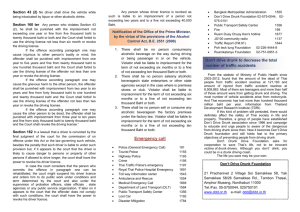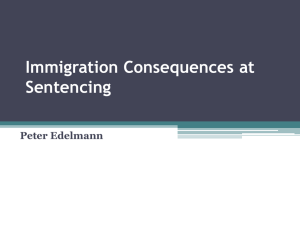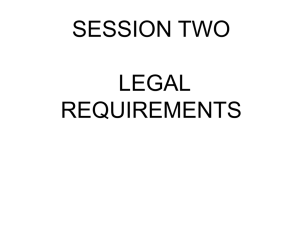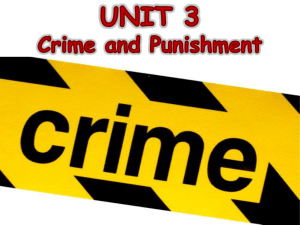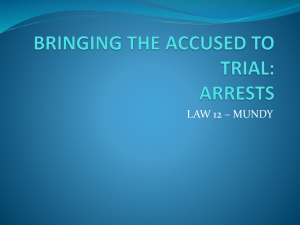appendix
advertisement
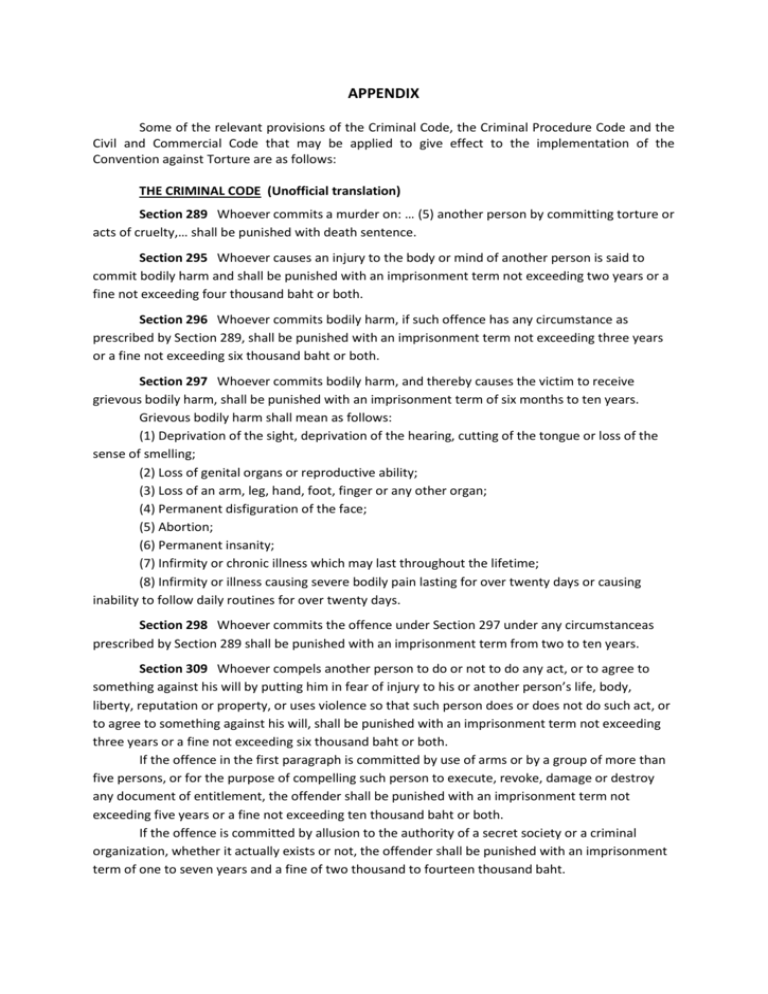
APPENDIX Some of the relevant provisions of the Criminal Code, the Criminal Procedure Code and the Civil and Commercial Code that may be applied to give effect to the implementation of the Convention against Torture are as follows: THE CRIMINAL CODE (Unofficial translation) Section 289 Whoever commits a murder on: … (5) another person by committing torture or acts of cruelty,… shall be punished with death sentence. Section 295 Whoever causes an injury to the body or mind of another person is said to commit bodily harm and shall be punished with an imprisonment term not exceeding two years or a fine not exceeding four thousand baht or both. Section 296 Whoever commits bodily harm, if such offence has any circumstance as prescribed by Section 289, shall be punished with an imprisonment term not exceeding three years or a fine not exceeding six thousand baht or both. Section 297 Whoever commits bodily harm, and thereby causes the victim to receive grievous bodily harm, shall be punished with an imprisonment term of six months to ten years. Grievous bodily harm shall mean as follows: (1) Deprivation of the sight, deprivation of the hearing, cutting of the tongue or loss of the sense of smelling; (2) Loss of genital organs or reproductive ability; (3) Loss of an arm, leg, hand, foot, finger or any other organ; (4) Permanent disfiguration of the face; (5) Abortion; (6) Permanent insanity; (7) Infirmity or chronic illness which may last throughout the lifetime; (8) Infirmity or illness causing severe bodily pain lasting for over twenty days or causing inability to follow daily routines for over twenty days. Section 298 Whoever commits the offence under Section 297 under any circumstanceas prescribed by Section 289 shall be punished with an imprisonment term from two to ten years. Section 309 Whoever compels another person to do or not to do any act, or to agree to something against his will by putting him in fear of injury to his or another person’s life, body, liberty, reputation or property, or uses violence so that such person does or does not do such act, or to agree to something against his will, shall be punished with an imprisonment term not exceeding three years or a fine not exceeding six thousand baht or both. If the offence in the first paragraph is committed by use of arms or by a group of more than five persons, or for the purpose of compelling such person to execute, revoke, damage or destroy any document of entitlement, the offender shall be punished with an imprisonment term not exceeding five years or a fine not exceeding ten thousand baht or both. If the offence is committed by allusion to the authority of a secret society or a criminal organization, whether it actually exists or not, the offender shall be punished with an imprisonment term of one to seven years and a fine of two thousand to fourteen thousand baht. 2 Section 3 1 0 Whoever detains or confines another person, or by any other means whatsoever, deprives such person of the liberty, shall be punished with an imprisonment term not exceeding three years or a fine not exceeding six thousand baht or both. If the commission of the offence in the first paragraph causes death or grievous bodily harm to the person detained, confined or deprived of the liberty, the offender shall be punished as provided for in Section 290, 297 or 298. Section 310 bis Whoever detains or confines another person or deprive him of liberty and makes such person do any act for him or for another person, shall be punished with an imprisonment term not exceeding five years or a fine not exceeding ten thousand baht. Section 3 1 2 bis If the offence according to Section 3 1 0 bis or Section 3 1 2 is committed against a child not over fifteen years of age, the offender shall be punished with an imprisonment term of three to ten years and a fine not exceeding twenty thousand baht. If the commission of the offence according to the first paragraph or Section 3 1 0 bis or Section 312 causes the following: ( 1 ) Bodily harm or mental harm to the victim, the offender shall be punished with an imprisonment term of five to fifteen years and a fine not exceeding thirty thousand baht; (2) Grievous bodily harm to the victim, the offender shall be punished with an imprisonment for life or an imprisonment term of seven to twenty years; (3 ) Death to the victim, the offender shall be punished with death sentence, imprisonment for life or an imprisonment term of fifteen to twenty years. Section 313 Whoever, in order to obtain a ransom: (1) Takes away a child not yet over fifteen years of age;: (2) Takes away a person over fifteen years of age by using deceitful means, threat, doing any act of violence, unjust influence or mode of coercion by any other means; or (3) Restrains or detains any person; Shall be punished with an imprisonment term of fifteen to twenty years and a fine of thirty thousand to forty thousand baht, or an imprisonment for life, or death sentence. If the commission of the offence according to the first paragraph causes grievous bodily harm to the person taken away, restrained or detained, or is done by acts of torture or cruelty so as to cause bodily or mental harm to such person, the offender shall be punished with death sentence or life imprisonment. If the commission of such offence causes death to the person taken away restrained or detained, the offender shall be punished with death sentence. THE CRIMINAL PROCEDURE CODE (Unofficial translation) Section 7/1 An arrested or accused person who is restrained or detained shall be entitled to, at the earliest occasion, inform or request the official to inform his relative or a trusted person of his arrest and the place of his restraint. The arrested or accused person shall also be entitled to: (1) Meet and take in privatean advice of a person to become his counsel; (2) Have his counsel or the trusted person attend his interrogation during the inquiry; (3) Receive the visit of or contact with his relative as appropriate; (4) Receive expeditious medical treatment in time of illness. The administrative or police official receiving the arrested or accused person shall have the duty to, at the earliest occasion, inform him of the rights set forth in paragraph one. 3 Section 8 From the moment the case is instituted, the defendant shall be entitled to: (1) Have his case considered in an expeditious, continuous and fair manner; (2) Appoint a counsel to represent him in the course of a preliminary hearing or trial in the Court of first instance, as well as in the Appeal and Supreme Courts; (3) Take in privatean advice of a counsel or a person to become his counsel; (4) Examine any article adduced as evidence and make a copy or take a photograph thereof. ( 5 ) Examine the court’s file of preliminary hearing or trial and make a copy thereof or request for a certified copy thereof with payment of costs, save where such costs are exempted by a judicial order; ( 6 ) Examine or copy the plea he has given during the inquiry or the supplementary document thereof. Should the defendant be represented by a counsel, the counsel shall be entitled to the same aforementioned rights as the defendant. From the moment the charge is entered by the public prosecutor in court, the injured person shall be entitled to the rights set forth in paragraph one (6) as on a par with the defendant. Section 44/1 In a case filed by the public prosecutor, if the injured person is entitled to claim a compensation in as much as the commission of offence by the defendant has caused him to lose his life, or sustain bodily or mental harm, injury to personal liberty, reputation or proprietary damage, he may submit to the court trying the criminal case a motion for coercively directing the defendant to make the compensation for such loss. … Section 5 7 An arrest, detention or imprisonment of a person as well as a search for a person or article in a private place may only be conducted upon a judicial order or warrant thereof, subject to the provisions of Sections 78, 79, 80, 82 and 94 of the present Code. A person who is detained or imprisoned by virtue of a judicial warrant may only be released upon a judicial warrant of release. Section 78 An administrative or police official may not arrest any person without a warrant or an order directed by a court, save: (1) Where the person in question commits a flagrant offence pursuant to Section 80; (2) Where the person in question is discovered under the suspicious circumstances that he is likely to cause harm and danger to another person or property of another person, by having in his possession implement, weapon or other object which may be used for the commission of an offence; ( 3 ) Where the grounds for issuing a warrant of arrest of the person in question are established under Section 66 (2 ), but by reason of urgent need, an application therefor cannot be made to the court; ( 4 ) Where it is the arrest of the accused or defendant who has absconded or is about to abscond after having been provisionally released under Section 1 1 7 by an administrative or police official. Section 83 In conducting an arrest, the official or private citizen shall inform the person to be arrested that he shall be under arrest, and order him to make his presence at the office of the local inquiry officer together with the person conducting the arrest, save where the arrested person may be brought to the office of the responsible inquiry officer at that very time. In case of necessity, such person may be apprehended. ….. 4 Section 8 4 The official or private citizen conducting the arrest shall without delaytake the arrested person to the office of the local inquiry officer pursuant to Section 8 3 where such person shall be delivered to an administrative or police official attached to such office. The following actions shall then be taken: (1) In case the arrest is done by an official, the official conducting the arrest shall inform the arrested person of the allegation and the essential facts of the offence alleged. If there is a warrant of arrest, such warrant shall be produced and read to the arrested person. A copy of the arrest note shall also be given to him. ….. The administrative or police official receiving the arrested person shall, upon having complied with paragraphone, informthe arrested person of the rights set forth in section 7 / 1 , and allow him to contact his relative or a trusted person so that he could inform such person about his arrest and the place of his restraint at the earliest occasion from the time he appears at the office of the inquiry officer under paragraph one.….. Section 87 An arrested person may not be restrained beyond the necessity according to the circumstances of the case. ….. In the event that the arrested person has not been granted a provisional release and it is necessary that an inquiry or a prosecution takes place, such person shall be brought before the court within forty eight hours after he has been brought to the office of the inquiry officer under Section 8 3 save for reason of force majeure or other unavoidable reasons. The inquiry officer or the public prosecutor shall apply to the court for a warrant of detention of the arrested person. In this respect, the court shall ask the arrested person whether he would raise any objection, and may also require the inquiry officer or public prosecutor to demonstrate the necessity or to produce evidence for its consideration. In case of an offence liable tothe maximum imprisonment for a term not exceeding six months, or a fine not exceeding five hundred baht or both, the court shall have the power to order one detention for a period not exceeding seven days. In case of an offence liable to the maximum imprisonment for a term not less than six months but not more than ten years, or a fine not less than five hundred baht or both, the court shall have to power to order several successive detentions not exceeding twelve days each, but the total period of detention shall not exceed forty eight days. In case of an offence liable to the maximum imprisonment for a term not less than ten years, irrespective of whether it is liable to any rate of fine, the court shall have the power to order several successive detentions not exceeding twelve days each, but the total period of detention shall not exceed eighty four days. In respect of paragraph six, if, upon completion of forty eight days, the public prosecutor or inquiry officer applies to the court for further detention by reason of necessity, the court may grant the application only when the public prosecutor or the inquiryofficer has demonstrated such necessity and sufficiently produced evidence for its hearing until it is satisfied. In regard to the hearing under paragraphs three and seven, the accused shall be entitled to appoint a counsel in the interest of objection and direct examination. If the accused is not yet represented by any counsel for Section 1 3 4 /1 has not yet been proceeded with, the court shall, at his request, appoint one for him. The counsel appointed shall be entitled to the gratuity and outlays according to Section 134/1, paragraph three, mutatis mutandis. ….. 5 Section 9 0 Where any person is alleged to be unlawfully confined in a criminal case or in any other event, the following persons shall be entitled to submit a motion to the court empowered to exercise criminal jurisdiction over such locality for the release of the person in question: (1) The person in question himself; (2) The public prosecutor; (3) The inquiry officer; (4) The prison governor or official; (5) The spouse or a relative of the person in question or any other person for his interest. Upon receipt of such application, the court shall instantaneously hold a hearing ex parte. Deeming the motion is well-grounded, the court shall have the power to, by order, direct the person carrying such confinement to bring the person in question before it without delay. And if the person carrying the confinement is unable to satisfy the court that such confinement is lawful, the court shall, by order, release the person in question at once. Section 107 Upon receipt of an application for provisional release, the official or the court shall instantly deliver an order. A provisional release must be granted to every accused or defendant on the basis of the criteria set forth in Sections 108, 108/1, 109, 110, 111, 112, 113 and 113/1. Every person concerned shall, without delay, comply with the order granting a provisional release pursuant to paragraphone. Section 1 3 4 / 1 In case of an offence liable to capital punishment or a case wherein the accused is below eighteen years of age on the day the inquiry officer informs him of the charge, the inquiry officer shall, prior to the interrogation, ask him whether he is represented by a counsel.If the accused does not have a counsel, the State shall furnish him with one. In case of an offence liable to a term of imprisonment, the inquiry officer shall, prior to the interrogation, ask the accused whether he is represented by a counsel. If the accused does not have acounsel and if it is the wish of the accused to be represented, the State shall furnish him with a counsel. ….. Section 135 In interrogating an accused, the inquiry officer shall not perform or cause to be performed an act of promising, threatening, deceiving, torturing, forcibly compelling, or, by unlawful means, encouraging the accused to give any statement in respect of the charge against him. Section 226/1 Where it appears to the court that any evidence is just per se but it has been obtained by an unjust act or by the result of an information produced or obtained through an unjust act, the court shall exclude it, save where the admittance of such evidence would be more beneficial to the carriage of justice and less detrimental to the criminal justice standard or fundamental rights and liberties of the people. ….. THE CIVIL AND COMMERCIAL CODE (Unofficial translation) Section 420 A person who, willfully or negligently, unlawfully injures the life, body, health, liberty, property or any right of another person, is said to commit a wrongful act and is bound to make compensation therefor. --------------------------
